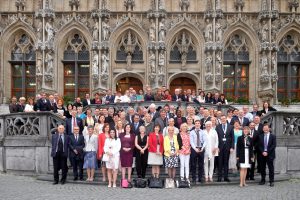Leuven 2016
Reports of the 16th Congress in Leuven
New: The Video about the congress is on YouTube
You are currently viewing a placeholder content from YouTube. To access the actual content, click the button below. Please note that doing so will share data with third-party providers.
http://www.anusca.it/flex/cm/pages/ServeBLOB.php/L/IT/IDPagina/8135
Foto’s 16de CONGRES EUROPESE BURGERLIJKE STAND & VLAVABBS CONGRES
The presentations of the first congress day of the EVS-congres are available on our website. Nationality law and the consequences thereof formed the central topics of the day. Professors Gerard-René de Groot and Patrick Wautelet presented the recent developments of nationality law in Europe. Their conclusion, which was also picked up by other referents, was clear: don’t seek complexity for your citizens. Don’t deliver for many years passports to someone and then conclude he or she isn’t a citizen (any more).
Professor Jinske Verhellen and doctor Susanne Gössl examined how the nationality of a person is the starting point for private international law in many countries. They pleaded with passion not to make a mix of migration law and family law and to choose logical solutions as states, civil servants, judges and citizens. Otherwise the risk is there to get lost in complexity.
In the afternoon the focus broadened, first to the European level and then to the world as a whole. Prof. Jo Shaw explored the European citizenship as a political and lively construction. Stephan Matyk of the European Commission presented the regulation to abolish the legalization on certain public documents. The EVS demands for the European institutions were put forward on behalf of the expert’s committee by our German colleague Beate Anefeld.
The day finished with the special situation of the stateless persons. They are not protected by a nationality. Statelessness often coincides with a lack of birth registration. Without the birth certificate a lot rights can be denied. Valeriia Cherednichenko of the UNHCR also showed a small film, also available on our Internet site, concerning what it means on a personal level to be stateless.
Wautelet_de_Groot
Verhellen_Goessl
Matyk
Cherednichenko
Anefeld

